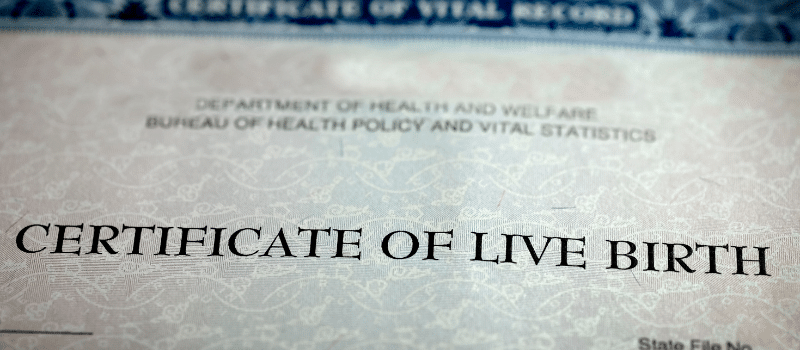We live in a time when the marriage rate is declining, couples are waiting much later to get married (or don’t feel the need to get married at all) and more children are being born out of wedlock. When parents are not married, questions regarding parentage, paternity, birth certificates and child support often arise, including:
- Does the father have to be on the birth certificate to get child support?
- If I don’t sign the birth certificate do I have to pay child support?
- Is a paternity test required for child support?
- What happens at a paternity hearing?
- What happens after paternity is established for child support?
- Do I have to have the father pay child support?
We’ll answer these questions and others in the article below. Keep in mind, laws regarding parentage, paternity, DNA testing and the like, do vary from state to state. The child custody lawyers at the Sisemore Law Firm are licensed to practice law in Texas, so we’ll provide answers to the questions here, based on the laws of this state.
Does the father have to be on the birth certificate to get child support?
Our Fort Worth family law firm frequently gets questions about birth certificates and child support. Some presumed or alleged fathers want to know, “If not on the birth certificate do I have to pay child support?” Some mothers want to know if they are required to put the father’s name on the birth certificate.
So, let’s first answer the question that headlines this blog: Does the father have to be on the birth certificate to get child support? The short answer is no. Just because the father’s name doesn’t appear on a child’s birth certificate, doesn’t mean he doesn’t have to pay child support.
Consequently, if your question is: If I don’t sign the birth certificate do I have to pay child support? The answer to that question is: If you are presumed to be the father of a child, the state of Texas expects you to help support that child financially and emotionally. That generally means you are obligated to pay child support whether you sign the birth certificate or not.
What does presumed father mean in Texas?
In most states, including Texas, men who want to dispute paternity need to overcome the presumption of paternity if they don’t want to pay child support. In other words, they would need to prove they are not the biological father of a child in order to be freed from the state’s statutory obligation to pay child support for that child.
According to Texas Family Code §160.204, “A man is presumed to be the father of a child if:
- He is married to the mother of the child and the child is born during the marriage;
- He is married to the mother of the child and the child is born before the 301st day after the date the marriage is terminated by death, annulment, declaration of invalidity, or divorce;
- He married the mother of the child before the birth of the child in apparent compliance with law, even if the attempted marriage is or could be declared invalid, and the child is born during the invalid marriage or before the 301st day after the date the marriage is terminated by death, annulment, declaration of invalidity, or divorce;
- He married the mother of the child after the birth of the child in apparent compliance with law, regardless of whether the marriage is or could be declared invalid, he voluntarily asserted his paternity of the child, and:
- The assertion is in a record filed with the vital statistics unit;
- He is voluntarily named as the child’s father on the child’s birth certificate; or
- He promised in a record to support the child as his own; or
- During the first two years of the child’s life, he continuously resided in the household in which the child resided and he represented to others that the child was his own.”
Of course, we all know affairs happen and some women lie about who the biological father of their child is. The mother of a child in Texas can decide whose name is listed as father on her child’s birth certificate; she can leave that section blank; and she can say the father of the child is deceased if she chooses.
Keep in mind, intentionally lying about paternity on a birth certificate (a legal document) is considered perjury, which is considered a crime. Unless there are aggravating circumstances, committing perjury is generally considered a Class A misdemeanor in Texas, which can result in fines and jail time.
Is a paternity test required for child support?
If a parent falls into one of the categories of presumed fathers described above, a paternity test isn’t necessarily required to have to pay child support. Per the Texas Family Code Section 160.102, the presumed father “is recognized as the father of a child until that status is rebutted or confirmed in a judicial proceeding.” Either party (mother or presumed father) can ask the court to order the presumed father to take a paternity test. The court can also order DNA testing if paternity is in question.
I strongly encourage anyone who is not 100% certain they are the father of a child to get a paternity test. Once parentage is adjudicated, meaning a legal decision has been made or legal documents have been filed (like a birth certificate or other formal agreement) regarding parentage, it’s very difficult to undo the adjudication of parentage.
Another issue that comes up for mothers in these situations, is getting a presumed father who doesn’t want to pay child support to take a paternity test in the first place. What happens if father doesn’t show up for paternity test for child support? If a court orders a party to take a child support paternity test and the party doesn’t comply, he could face contempt of court charges, which may result in fines and jail time.
And under Texas Family Code Section 160.622, the court could even “adjudicate parentage contrary to the position of an individual whose paternity is being determined on the grounds that the individual declines to submit to genetic testing as ordered by the court.” If the court orders a presumed father to take a paternity test, he should be aware there will be serious consequences if he refuses.
What happens at a paternity hearing?
The paternity hearing occurs once the DNA test results become available. During the hearing, the DNA expert from the lab may be called to testify to explain the test results, unless both parties are in agreement about the test results.
If the court finds the lab results do in fact prove the alleged father is not the biological father, a valid denial of paternity can then be filed with the vital statistics unit. Once the denial has been filed, the presumed father would be discharged from all parental rights and duties regarding the child in question.
What happens once paternity is established (presumed father is bio dad)?
If the court finds the presumed father is in fact the biological father of the child, the father would then be obligated to provide financial support for the child. If the mother of the child is asking the father to pay child support, the father’s income and financials would be reviewed to determine what his monthly child support obligation would be.
Parents who want to be fully prepared for what happens after paternity is established for child support need to be ready to dive right into a full custody case right then and there. Along with establishing who pays and how much is child support in Texas, the court will usually want to flesh out other details regarding custody, visitation and who will be responsible for the other parental rights and duties set forth in Texas Family Code Chapter 151.
Can the parents agree to forgo child support altogether?
There are some situations where parents will agree that neither parent should pay child support. In fact, questions about this come up frequently at our law firm. Some parents figure they get along well, and they’ll both do what is best for their child. In Texas, the courts will usually approve formal agreements for no child support if both parties agree to it. Oftentimes, these agreements also include stipulations regarding visitation and access.
However, the state of Texas could still mandate a father pay child support if the mother has tapped the state for resources to help support her child. And we do see that happen from time to time with no child support agreements.
Problems tend to arise with no child support agreements when a party trusts the other parent to take care of certain expenses for their child, only for the other parent to fail to provide support. If the parent who is providing all of the support for the child wants to go after the other parent for child support, they will need to follow Texas statutory requirements for modifying child support.
In order to have their case heard, the parent would need to show there has been a material and substantial change in circumstances that warrants modifying their no child support agreement. These are the same statutory guidelines parents with traditional child support agreements must follow to modify child support.
Learn more about changes in circumstances for modifying child support here.
We can answer your questions about paternity, child support and parental rights
If you would like to assert your parental rights as a father, have been ordered to pay child support when a child’s paternity is in question or are trying to collect child support, we can help. To schedule a confidential case review with a child custody lawyer at the Sisemore Law Firm, please call our office at (817) 336-4444 or schedule online.
Photo Source: Canva.com




